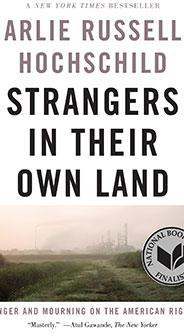
Arlie Russell Hochschild
Note moyenne : /5 (sur 0 notes)
Note moyenne : /5 (sur 0 notes)
Résumé :
The National Book Award Finalist and New York Times bestseller that became a guide and balm for a country struggling to understand the election of Donald Trump
"A generous but disconcerting look at the Tea Party. . . . This is a smart, respectful and compelling book."
—Jason DeParle, The New York Times Book Review
When Donald Trump won the 2016 presidential election, a bewildered nation turned to Strangers in Thei... >Voir plus
"A generous but disconcerting look at the Tea Party. . . . This is a smart, respectful and compelling book."
—Jason DeParle, The New York Times Book Review
When Donald Trump won the 2016 presidential election, a bewildered nation turned to Strangers in Thei... >Voir plus
étiquettes
Ajouter des étiquettes
Que lire après Strangers in their own landVoir plus
Citations et extraits (17)
Voir plus
Ajouter une citation
[...] the British anthropologist Sir Edward Evan Evans-Pritchard called it when studying something utterly different. Evans-Pritchard had been researching a pastoral people of the Sudan called the Nuer, who had a remarkable memory for some things and completely forgot about others. Men and women both remembered eleven generations of male ancestors, for example, but largely forgot their female counterparts. There was, the anthropologist sensed, a structure to what they remembered and forgot that was based on the power of the Nuer’s dominant institution[...]. Dominant within that system were men. So memory, Evans-Pritchard reasoned, was an indirect expression of power. The Arenos faced structural amnesia about something else and linked to a different source of power: the Louisiana Chemical Association, the Society of the Plastics Industry, the Vinyl Institute, Shell Oil, PPG Industries, and their leaders in government. Spokesmen for this source of power drew the popular imagination to the exciting economic future. The Arenos felt that their silent bayou, their buried kin, their dead trees were forgotten, like the female half of the Nuer.
As I take leave of the Arenos, I ask them about the lawsuit they have filed against the polluters of Bayou d’Inde. Fifty-three plaintiffs, residents on the bayou and workers in nearby companies, had sued twenty-two companies. “We’re still waiting,” Harold answers. Nothing could fully make up for the loss of trees, birds, and fish from their beloved bayou, but the Arenos are hoping mightily that the lawsuit will at least provide money to move, for despite their attachment to the place, their distrust of the water, the banks, the air makes them feel like refugees in their own home. If they win the suit, it will be a moral victory, a remembered fact. A lawyer who worked in the firm that filed their suit (the lead lawyer had passed away) tells me with a sigh that it is common corporate strategy, with the cooperation of the state agencies, to string these lawsuits out for so long that plaintiffs die before money is due. Still, much time has passed.
I ask myself, again, how people in a poor state with the worst health in the nation can look askance at a federal government that provides 44 percent of its state budget, and how such a polluted state can take a dim view of government regulation of polluters. A political campaign has a central place in the cultural life of a people. It tells citizens what issues powerful people think are worth hearing about. I was backing into the picture I wanted to see by noticing what wasn’t in it. It was like trying to understand a photograph by studying the negative. I found myself focusing not on what people remembered, focused on, and said, but on what they forgot, disregarded, and did not say. I was backing into the deep story, as I am calling it, and noticing what, in human consciousness, it crowded out.
The Greek word “nostalgia” derives from the root nostros, meaning “return home,” and algia, meaning “longing.” Doctors in seventeenth-century Europe considered nostalgia an illness, like the flu, mainly suffered by displaced migrant servants, soldiers, and job seekers, and curable through opium, leeches, or, for the affluent, a journey to the Swiss Alps. Throughout time, such feeling has been widely acknowledged. The Portuguese have the term saudade. The Russians have toska. The Czechs have litost. [...] the Spanish mal de corazon. Many who have suffered from this illness of heart have been forced to leave a beloved home that is itself still there. But Harold and Annette Areno live at home in an environment no longer there.
[...] do we need all the new plastic the American Chemical Association is promising us? Weren’t we entering into a strange cycle? Many people I was talking to carried around plastic water bottles, partly for convenience, partly out of distrust of local waters. And with cheap natural gas at hand, the American Chemical Association said it could triple the amount of feedstock needed to make plastic. But if we triple our plastics, more petrochemical companies will pollute more public waters, which will lead more people to pay for more plastic bottles filled with ever more scarce clean water. We’ll throw away more plastic bottles, buy more, and further expand the market for plastic, the production of which pollutes water.
Les Dernières Actualités
Voir plus
Autres livres de Arlie Russell Hochschild (1)
Voir plus
Quiz
Voir plus
The Book of Ivy - avez-vous bien lu ?
Comment s'appelle la soeur d'Ivy ?
Carrie
Calie
Karine
Callie
10 questions
86 lecteurs ont répondu
Thème : The book of Ivy de
Amy EngelCréer un quiz sur ce livre86 lecteurs ont répondu



























